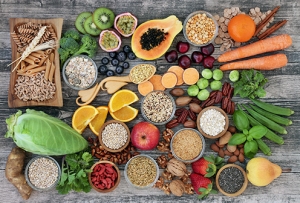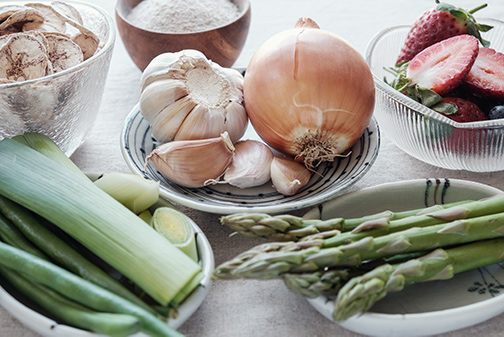What Are Prebiotics?
The standard definition for prebiotics from the International Scientific Association for Probiotics and Prebiotics is “a substrate that is selectively utilized by host microorganisms conferring a health benefit.” Mainly, prebiotics is food for our good bacteria, otherwise known as probiotics. They produce health benefits to the host when using prebiotic food.
Historically, the term “prebiotic” was introduced from studies on gut microbiota. Thus, for a long time, dietary fibers were the only substance regarded as prebiotics. Later, researchers revealed that microbes live in other interfaces between us and the outside world, including the airway, reproductive tract, and skin. However, probiotics in those environments feed on substrates other than dietary fiber.
The health benefits of prebiotics are a result of their usage by probiotics and, therefore, are part of the function of the beneficial bacteria. I have summarized the probiotic benefits in another blog. You may read the details there. Briefly, the effects of probiotics that are relevant to prebiotics include the modulation of our immune system and the provision of extra energy and nutrients. Importantly, the regulation of the immune system is one that is ubiquitous in all interfacial microbial niches in human beings.
 The different kinds of prebiotics
The different kinds of prebiotics
Prebiotics support modulation of the immune system in the gut, airway, reproductive tract, and on the skin. I have described the detailed mechanisms of how probiotics interact with our immune system in our research article. Please refer to the study for details. Briefly, probiotics utilize prebiotics to produce metabolites that calm down the immune system. The prebiotics for this function in different niches are listed in Table 1.
Table 1. Prebiotics in microbial niches
| Gut | Airway | Vagina | Skin | |
| Prebiotics | Dietary fibers: FOS, GOS, HMO… | Sugars, amino acids | Sugars | Fatty acids |
| Natural sources | Food: chicory root, dandelion greens, artichoke, garlic, onions, asparagus, bananas, milk | Saliva, mucus | Mucus | Sebaceous gland |
| Probiotics | Bifidobacterium, Lactobacillus, Faecalibacterium | Streptococcus & Veilonella | Lactobacillus acidophilus | Cutibacterium acnes |
| Best practices for healthy people | Eat food rich with dietary fibers, not only the ones above, but add whole grains, veggies, fruits, and fungi. | Enough personalized oral hygiene to keep teeth and gums healthy, not excessive, to suppress oral probiotics. | Leave it alone. | Not too frequent showers, use gentle cleaning agents, no antibacterial soap. |
Do I need to take prebiotics regularly?
As you can see from Table 1, prebiotics and probiotics co-exist together naturally. Undoubtedly, prebiotics usually exist in those niches in abundance for the proper probiotics to flourish. As a result, we do not have to pay special attention to them. Indeed, probiotics should thrive naturally and make peace with human hosts. And that peace will be ours as hosts also.
Under normal conditions, a healthy diet with proper portions of fermented food should be sufficient for most people’s gut health. Other niches, mouth and skin, are different stories under modern lifestyle. Prebiotic supplements can help oral and skin probiotics recover after oral hygiene or showering. Please see my other blog on probiotics for additional details.

